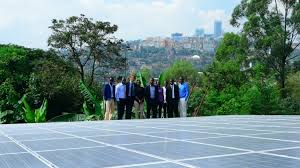Rwanda: American Firm Installs Solar Power At the Kigali Genocide Memorial Centre

Posted on :Monday , 11th April 2016
Centennial Generating Company, a Washington DC-based company that provides power systems for commercial and industrial customers has installed a solar power system at the Kigali Genocide Memorial Centre which will bring down power costs by 20 per cent.
The memorial centre which heavily depends on financial handouts is grappling with high costs of power with management claiming they at times spend Rwf400,000 monthly on fuelling the generators.
The challenge Rwanda faces is the unreliable power supply from the grid compelling homes, institutions and businesses to run standby diesel generators adding to operational costs.
The site where 250,000 genocide victims were buried is set to reduce the ballooning power costs as the centre needs 24 hours power supply to support the electronic archives server.
"Instead of requiring upfront capital, Centennial is selling us the electricity generated by the solar system at a discount compared with our current power costs. This will allow us to dedicate more funds to our remembrance and peace education programmes," said Honere Gatera, manager of Kigali Memorial Centre.
The solar power is also expected to ensure steady and reliable supply for the centre and reduce pressure on the national grid.
And though the centre receives an estimated 80,000 guests annually, the services are free meaning the donors have to fork out more finances to meet the budget. and additional costs of running a standby diesel generator.
Centennial finances, installs, owns, operates and maintains the power system which mitigates the high initial cost of solar photovoltaic (PV) systems, a significant barrier to PV adoption.
This means the beneficiary client pays for the power he has consumed and the price is locked in for the over 25 years of the contract.
Centennial's focus is on working with commercial and industrial customers in and near cities to help support the emerging middle class.
During Phase 2 of the project, scheduled for later this year, Centennial will co-locate the existing solar system with battery storage in order to maintain the facility's operational resiliency and reduce a large portion of the Genocide Memorial's need for a standby diesel generation.
Centennial's solar project at the Genocide Memorial will serve as a site for training programmes on renewable energy operations and maintenance skills in co-ordination with the non-profit organisation Women for Women International.
Please Select an Option
-
Exhibiting
-
Visiting
-
Information

Expogroup
Expogroup is a full service exhibition organiser with over 30 years experience in International trade exhibitions. Our current portfolio includes 28 annual exhibitions from a diverse range of industries being held across the Middle East & Africa.
EXPOGROUP © 2026 | Privacy policy